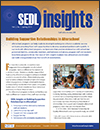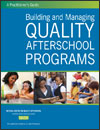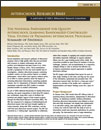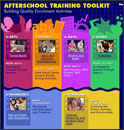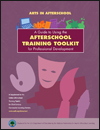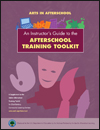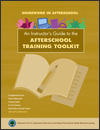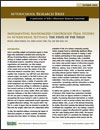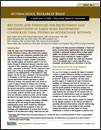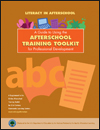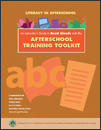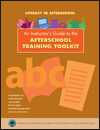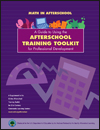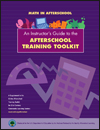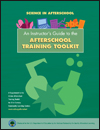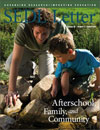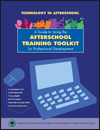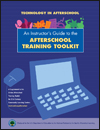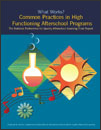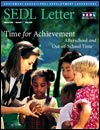SEDL's Free A-Z List of Free Resources for Afterschool
Afterschool
All Products in this Category
Products are listed by date published.
Afterschool programs can help students develop knowledge to enhance academic success while also providing them with opportunities to develop social and problem-solving skills. In our work with afterschool programs, we have seen that positive relationships with school-day personnel, families, community members, and between and among program staff and students help these programs thrive. This issue of SEDL Insights explores how afterschool practitioners can build strong relationships that benefit all stakeholders.
A Practitioner's Guide: Building and Managing Quality Afterschool Programs is designed to share with you the practices that can help you cover it all—great programming, terrific staff, positive relationships, and plenty of resources to lead and sustain successful afterschool programs.
SEDL provided analytic and technical support to three large-scale randomized controlled trials (RCTs) assessing the effect of promising literacy curricula in afterschool settings on student academic achievement. This research brief, the last in a three-part series, presents an overview of the studies and a summary of the implementation and findings across the 2 years of funding.
This online database contains fun and enriching lesson plans for afterschool projects in the arts, literacy, mathematics, science, and technology. Expanded learning practitioners can also submit their favorite lesson plans for consideration.
These 25 short videos are based on visits to afterschool programs across the country identified through a rigorous process based on data suggesting their afterschool academic practices are positively impacting student learning. The videos provide real-life examples of successful afterschool instruction, and they support the goals of the 21st Century Community Learning Centers by illustrating fun and engaging ways to embed academics in afterschool.
This online toolkit provides resources for developing fun, innovative, and academically enriching activities for afterschool and expanded learning programs. The toolkit includes promising practices and sample lessons in the arts, literacy, math, science, technology, and homework help.
AfterWords was a monthly e-newsletter published by the National Center for Quality Afterschool from Jan. 2007 to Dec. 2008. The award-winning newsletter provided up-to-date research on high-quality afterschool and expanded learning practices and methods that instructors and site coordinators could use to implement the practices in their own programs.
The six promising practices in afterschool for the arts identified in the Afterschool Training Toolkit are as follows: Building Skills in the Arts; Expressing Yourself Through the Arts; Making Connections to History and Culture; Thinking and Talking About Works of Art; Integrating the Arts With Other Subjects; Involving Families and Communities. Each practice is built on youth development principles and research on effective arts instruction. At their core, the Afterschool Training Toolkit materials are designed to illustrate techniques and activities that leverage student curiosity to make the arts in afterschool both enjoyable and academically relevant. This guide provides professional development ideas for each practice.
The six promising practices in afterschool for the arts identified in the Afterschool Training Toolkit are as follows: Building Skills in the Arts; Expressing Yourself Through the Arts; Making Connections to History and Culture; Thinking and Talking About Works of Art; Integrating the Arts With Other Subjects; Involving Families and Communities. When used with the Afterschool Training Toolkit, the lessons in this instructor’s guide will help you master these promising practices. Once you become proficient at these practices, you should be able to use them to develop other arts lessons.
The four promising practices in afterschool for homework help identified in the Afterschool Training Toolkit are as follows: Involving Day Schools, Families, and Communities; Managing and Organizing the Homework Environment; Monitoring and Communicating About Student Progress; and Tutoring, Mentoring, and Building Study Skills. When used with the Afterschool Training Toolkit, the information in this instructor’s guide will help you master these promising practices. Once you become proficient at these practices, you should be able to use them to develop an effective afterschool homework help program.
SEDL provided analytic and technical support to three large-scale randomized controlled trials (RCTs) assessing the effect of a promising literacy curriculum in afterschool settings on student academic achievement. This research brief is the first in a series intended to provide the field with insights culled from this collaborative effort.
SEDL provided analytic and technical support to three large-scale randomized controlled trials (RCTs) assessing the effect of promising literacy curricula in afterschool settings on student academic achievement. This research brief is the second in a series intended to address some of the key challenges faced during the studies to provide insights to the research and practice community.
The Afterschool Training Toolkit materials are designed to illustrate techniques and activities that leverage student curiosity to make literacy in afterschool both enjoyable and relevant. This guide provides professional development ideas for promising literacy practices in afterschool.
The National Partnership for Quality Afterschool Learning developed this instructor’s guide to accompany its Afterschool Training Toolkit, a free online staff development tool. Both the guide and the toolkit materials are designed to give afterschool instructors the resources they need to build fun, innovative, and academically enriching activities that not only engage students, but extend their knowledge in new ways and increase academic achievement.
The six promising practices in student achievement in literacy identified in the Afterschool Training Toolkit are as follows: Book Discussion Groups and Literature Circles; Read Aloud; Story and Literature Dramatizations; Writing; Family Literacy Events; One-on-One and Small-Group Tutoring. When used with the Afterschool Training Toolkit, the lessons in this instructor’s guide will help you master these promising practices. Once you become proficient at these practices, you should be able to use them to develop other literacy lessons.
The Afterschool Training Toolkit materials are designed to illustrate techniques and activities that leverage student curiosity to make mathematics in afterschool both enjoyable and relevant. This guide provides professional development ideas for each of the seven promising practices in afterschool math enrichment.
The seven promising practices in afterschool math identified in the Afterschool Training Toolkit are as follows: Finding Math; Math Centers; Math Games; Math Projects; Math Tools; Math Tutoring; Family Connections. When used with the Afterschool Training Toolkit, the lessons in this instructor’s guide will help you master these promising practices. Once you become proficient at these practices, you should be able to use them to develop other math lessons.
For use with the online Afterschool Training Toolkit, these free guides give program directors and site coordinators resources for leading professional development courses on building engaging afterschool activities.
The five promising practices in afterschool for science identified in the Afterschool Training Toolkit are as follows: Investigating Science Through Inquiry; Exploring Science Through Projects and Problems; Integrating Science Across the Curriculum; Engaging Families and Communities in Science; Tutoring to Enhance Science Skills. When used with the Afterschool Training Toolkit, the lessons in this instructor’s guide will help you master these promising practices. Once you become proficient at these practices, you should be able to use them to develop other science lessons.
This issue of SEDL Letter is devoted to topics centered around afterschool and family and community involvement, with a focus on what the latest research shows.
This guide focuses on using a practical staff development model for learning about the six technology practices featured in the Afterschool Training Toolkit and how they can support learning. Each technology practice is introduced with two to four activities ranging in length from 15 to 20 minutes. Activities include watching videos, planning lessons, and reading related resources.
The six promising practices in afterschool technology identified in the Afterschool Training Toolkit are as follows: Developing Self-Expression and Creativity; Gathering and Sharing Information; Finding and Solving Problems; Living and Working With Technology; Learning in Virtual Spaces; Building Skills and Understanding. When used with the Afterschool Training Toolkit, the lessons in this instructor’s guide will help you master these promising practices. Once you become proficient at these practices, you should be able to use them to develop other technology lessons.
This research synthesis examines the intrinsic and extrinsic value of arts instruction in afterschool programs and the extent to which arts instruction enhances overall learning and academic achievement.
In an effort to identify and incorporate quality practices into existing and future afterschool programs, the U.S. Department of Education commissioned the National Partnership for Quality Afterschool Learning (National Partnership) to study high functioning 21st Century Community Learning Center programs. The purpose of this study was to document practices to be used to develop resources and professional development that address issues relating to the establishment and sustainability of afterschool programs, to provide models and indicators of promising practices, and to highlight other descriptive information that local sites can access in planning new afterschool programs or improve existing ones.
Afterschool and out-of-school programs across the country are providing students with more than a place to hang out after school. In this issue of SEDL Letter, read about promising practices and new research findings related to afterschool programs.
This study examined high-performing after-school projects funded by The After-School Corporation (TASC), to determine what characteristics, if any, these projects shared. Evaluators reanalyzed student performance data collected during the multiyear evaluation of the TASC initiative to identify projects where the TASC afterschool program was especially likely to have contributed to improvements in studentsÕ academic achievement.

